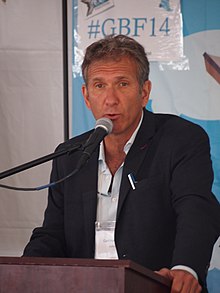Carl Hoffman
Carl Hoffman | |
|---|---|
 Hoffman, 2014 | |
| Born | May 4, 1960 Washington, D.C., United States |
| Occupation | Journalist, author |
| Nationality | American |
| Education | Bachelor of Arts |
| Alma mater | University of Massachusetts Amherst (B.A., 1983) |
| Website | |
| carlhoffman | |
Carl Hoffman (born May 4, 1960) is an American journalist and author whose work has most recently focused on western fascination with indigenous cultures, especially in New Guinea and Borneo.
Biography[]
Carl Hoffman is a second generation native of Washington, D.C., a graduate of the District of Columbia public schools.
Hoffman is the author of a number of narrative non-fiction books, about his own trips and those of other contemporary travelers and explorers. Hoffman is a former contributing editor at National Geographic Traveler magazine, a former contributing editor at Wired and has published articles in Outside, Smithsonian, Men’s Journal, National Geographic Adventureand many others. Hoffman has traveled to Afghanistan, Sudan, Congo, New Guinea, Greenland, Mongolia, Russia, China, Indonesia and more than 75 other countries on assignment
Books[]
The Last Wild Men of Borneo is a dual biography of a Swiss national and self-styled wild-man, Bruno Manser; and , an American prototypical 1960s hippie who settled in Bali and became leading world exporter and expert of primitive art. It explores the theme of Western fascination with primitive cultures and the interplay between them.[1][2]
In Savage Harvest,[3][4] Hoffman set out to untangle what happened to Michael Clark Rockefeller, the son of New York Governor Nelson Rockefeller, who vanished in 1961. Hoffman learned to speak Bahasa Indonesia and lived in a remote village amid 10,000 square miles of road-less swamp with the Asmat, a tribe of former headhunters and cannibals on the southwest coast of New Guinea.
In Lunatic Express, he traveled 50,000 miles around the world on its most dangerous conveyances, including by bus across Afghanistan and through the Gobi desert on a 20-ton propane truck.
Awards and honors[]
Hoffman has won five Lowell Thomas Awards from the Society of American Travel Writers Foundation[citation needed] and three North American Travel Journalism Awards[citation needed].
The Last Wild Men of Borneo was shortlisted in 2019 for an Edgar Award for Best Fact Crime Fiction and was a Banff Mountain Book Award finalist.
Savage Harvest was a New York Times Editor's Choice, was included in Amazon Editors' Picks for the 100 Best Books of 2014,[5] The Washington Post as one of its 50 notable non-fiction books of the year,[6] it was among the Kirkus Reviews "Best Books" of 2014[7] and it was shortlisted for the 2015 Edgar Award in the "Best Fact Crime" category.[8]
The Lunatic Express was named one of the ten best books of 2010 by The Wall Street Journal.[9]
Works[]
- Carl Hoffman (2018). The Last Wild Men of Borneo: A True Story of Death and Treasure. William Morrow. ISBN 978-0062439024.
- Carl Hoffman (2014). Savage Harvest: A Tale of Cannibals, Colonialism and Michael Rockefeller's Tragic Quest for Primitive Art. William Morrow. ISBN 9780062116161.
- Carl Hoffman (2010). The Lunatic Express: Discovering the World Via Its Most Dangerous Buses, Boats, Trains and Planes. Ballantine Books. ISBN 9780767929813.
- Carl Hoffman (2001). Hunting Warbirds: The Obsessive Quest for the Lost Airplanes of World War II. Broadway Books. ISBN 9780345436184.
References[]
- ^ Dennis Drabelle (March 8, 2018). "Two Westerners in search of art and adventure in Borneo". The Washington Post. Retrieved July 21, 2018.
- ^ Tim Sohn (March 7, 2018). "Reality Is Fantasy in 'The Last Wild Men of Borneo'". Outside. Retrieved July 21, 2018.
- ^ Hammer, Joshua (2014-04-04). "'Savage Harvest,' by Carl Hoffman". The New York Times. ISSN 0362-4331. Retrieved 2017-07-27.
- ^ Sohn, Tim (2014-04-09). "Non-Answers". Slate. ISSN 1091-2339. Retrieved 2017-07-27.
- ^ "Best of 2014". Amazon.com. 2014. Archived from the original on November 11, 2014. Retrieved May 27, 2016.
- ^ "50 notable works of nonfiction". The Washington Post. November 20, 2014. Retrieved July 21, 2018.
- ^ "Best Nonfiction Books of 2014". Kirkus Reviews. Retrieved July 21, 2018.
- ^ Louise Phillips (January 21, 2015). "The 2015 Edgar Award Nominees". writing.ie. Retrieved July 21, 2018.
- ^ Mark Lasswell (December 24, 2010). "Year in Reviews: Books Our Critics Loved". The Wall Street Journal. Retrieved July 21, 2018.
External links[]
- "Cannibals And Colonialism: Solving The Mystery Of Michael Rockefeller". NPR.org. 2014-03-18. Retrieved 2018-02-02.
- "Meet Carl Hoffman". Indonesia Expat. 2014-09-08. Retrieved 2018-02-02.
- American male journalists
- Living people
- 1960 births
- University of Massachusetts Amherst alumni